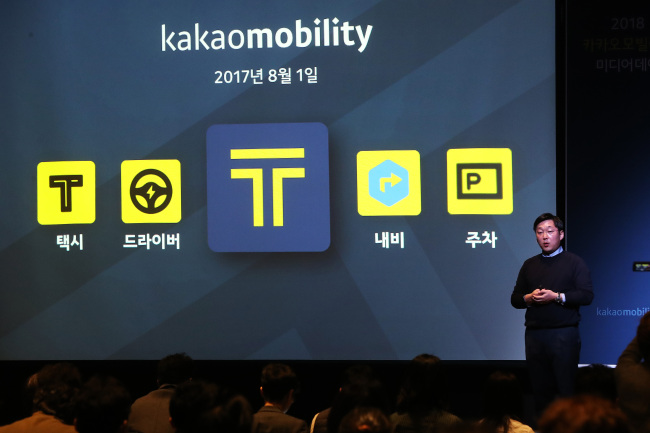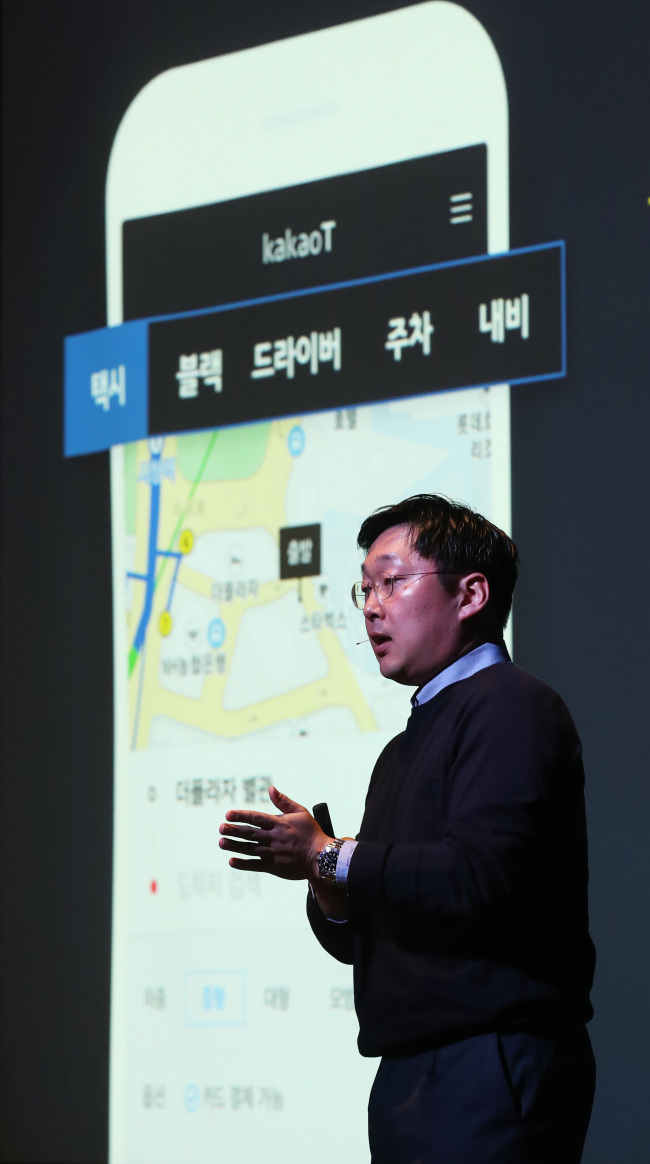Kakao Taxi seeks monetization with addition of paid taxi-hailing options
By Sohn Ji-youngPublished : March 13, 2018 - 15:06
Kakao Taxi, South Korea’s most widely used taxi-hailing mobile app, is introducing a “paid option” that lets users call up taxis faster or immediately by paying an extra fee on top of the ride fare.
The move marks Kakao’s first attempt to monetize Kakao Taxi, which, despite amassing a large user base over the years, has yet to find a concrete business model for generating stable profits.
Kakao Mobility, which operates all of Kakao’s mobility services including Kakao Taxi under the collective Kakao T app, announced Tuesday that it is adding two paid options to its taxi-hailing service: “priority call” and “immediate dispatch.”
A priority call option sends a user‘s ride request to a taxi driver who is more likely to accept the call according to analytic algorithms, enabling faster pickup than before.
It leverages artificial intelligence algorithms to direct a particular call request to taxis that are most likely accept that call. Kakao’s AI engine analyzes the previous call acceptance habits of taxi drivers combined with factors like the time of day and traffic to find the best match.
On the other hand, the immediate dispatch option allows paying users to be immediately matched with an available taxi nearby. It intends to be the fastest and most certain way of ensuring a ride match.
The move marks Kakao’s first attempt to monetize Kakao Taxi, which, despite amassing a large user base over the years, has yet to find a concrete business model for generating stable profits.
Kakao Mobility, which operates all of Kakao’s mobility services including Kakao Taxi under the collective Kakao T app, announced Tuesday that it is adding two paid options to its taxi-hailing service: “priority call” and “immediate dispatch.”
A priority call option sends a user‘s ride request to a taxi driver who is more likely to accept the call according to analytic algorithms, enabling faster pickup than before.
It leverages artificial intelligence algorithms to direct a particular call request to taxis that are most likely accept that call. Kakao’s AI engine analyzes the previous call acceptance habits of taxi drivers combined with factors like the time of day and traffic to find the best match.
On the other hand, the immediate dispatch option allows paying users to be immediately matched with an available taxi nearby. It intends to be the fastest and most certain way of ensuring a ride match.

The fees -- which Kakao has yet to determine -- will be immediately charged to the user’s credit card registered to the app when a match is made under the two paid options. Users pay for the ride fare separately at the end of the ride, as usual.
The immediate dispatch option is expected to be more expensive than the priority call option, given the difference in user benefits, according to Kakao Mobility.
Kakao Taxi will retain the current taxi-hailing service available free of charge, under the “regular call” option where passengers can place ride requests for free.
Does that mean taxi drivers using the app will only accept paid calls, marginalizing passengers who want to opt for only the regular call option, while providing taxi drivers further incentive to discriminate between passengers?
Acknowledging the concerns, Kakao Mobility CEO Jung Joo-hwan said the app is adopting a points system that will reward taxi drivers based on driving record and customer feedback, incentivizing them to pick up more ride requests, both paid and unpaid.
Jung further noted that the addition of the two paid taxi-hailing options is designed to alleviate recurring complaints that it is difficult to hail taxis during peak hours and in city centers.
“The addition of the paid options not only means profits for Kakao, but is a way of incentivizing taxi drivers to pick up more ride requests from passengers. In turn, passengers’ mobility needs are better met,” said Jung.
“I believe a business model that not only generates profits but also solves existing problems will grow faster and expand more,” he said.
To address a shortage of taxis available during peak morning and evening commute hours, Kakao Mobility is further planning to introduce ride-sharing services through its recently acquired carpooling app Luxi.

Kakao will offer ride-sharing options in addition to its regular taxi-hailing service during commute hours when paid carpooling activities are permitted by law -- 5 a.m. to 11 a.m. and 5 p.m. to 2 a.m. on weekdays only.
With the wider options, the mobile transport platform company hopes that passengers who cannot hail taxis during peak commute hours can turn instead to ride-sharing.
Kakao Mobility plans to adopt the carpooling feature in its Kakao T app by as early as the second or third quarter of this year, according to CEO Jung.
Globalization is another aim for Kakao’s taxi-hailing services. Kakao Mobility has partnered with Japan’s most popular taxi-hailing app Japan Taxi to enable Korean passengers to catch taxis in Japan using the familiar Kakao T app.
Kakao Mobility has also made a strategic investment in the local mobility app operator Easi6, which it hopes to leverage to make inroads into Southeast Asia.
Looking ahead, Kakao’s mobility unit is seeking to expand into autonomous driving technologies as well. It is setting up a new team called the “autonomous mobility lab” to research how Kakao’s mobility data can be leveraged to build useful self-driving platforms.
Last year, Kakao Mobility, along with Kakao-owned venture capital firm K Cube Ventures, invested a combined 400 million won ($375,000) in Seoul-based autonomous driving software startup Mars Auto.
Kakao Mobility is a subsidiary of Kakao, which operates Korea’s most widely used mobile messenger KakaoTalk. It was spun off from Kakao as an independent company in August 2017.
Kakao owns 69.3 percent of Kakao Mobility, while US-based private equity firm TPG owns the remaining 30.7 percent.
The smart mobility firm offers its services through the Kakao T app, which includes taxi-hailing service Kakao Taxi, chauffeur service Kakao Driver, mobile navigation service Kakao Navi and parking space search and booking service Kakao Parking.
By Sohn Ji-young (jys@heraldcorp.com)


















![[Today’s K-pop] BTS pop-up event to come to Seoul](http://res.heraldm.com/phpwas/restmb_idxmake.php?idx=642&simg=/content/image/2024/04/17/20240417050734_0.jpg&u=)